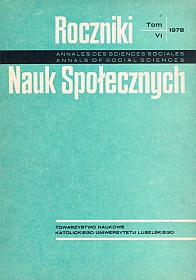Foundations of the New World Economic Order
Abstract
The author analyses the United Nations documents referring to (the so-called “new world economic order”, and particularly to the Charter of Economic Rights and Duties of the States and documents of the Church referring to the problem of development of the Third Worlds.
Extant economic structures are characterised by the-division .Of the world into centre and peripheries dependent on the former and are. formed on- the basis of wrong individualistic-liberal principle of profit and free competition - — without the participation of the Third World. Socio-economic development of the international community within the framework of these structures, is' impossible.
The Charter of Economic Rights and Duties of the States concentrates on three problems: firstly, on securing the sovereign equality of all states; secondly, on industralization of the Third World: thirdly, on improvement of terms of trade. Basing his argument on the social doctrine of the Church, the author accepts the following leading principles from which requests for help, and s recommendations for development policy may be derived: the principle-of equal access to material and cultural goods for all people; the principle of equality of all people and all states in their dignity; and the right of every person to integral development.
The author points out the principle of justice as the most important of the fifteen principles listed in the above mentioned charter. International justice is based, according to the author, on two inseparably linked extremes: on ”suum cuique tribuendi” — on what falls by right to every subject, and on cultural- -economic cooperation as an essential factor of realization of that ”suum”. International justice should be realized in three dimensions: as justice in the sphere of production of goods (distribution of work); as justice in economic take-off; and justice in distribution of economic goods (profit).
The program of the new world economic order takes for granted not exactly and not only the change on behalf of .the Third World done at the expense of other industrialized countries, but also the radical transformation both of inter- national and internal economic structures. Such a transformation would be in the interest of developing countries.
The postulate of change an the international division of work, which constitutes one of the elements of the program of the new order, has two aspects: a — the industrialization of developing countries which, according to the Declaration of Lima, should reach 25% share in world production in the year 2000; b — granting priviledged conditions of sale on the markets of industrialized countries to export from developing countries (that should be done by introduction of preferential tariff for that export).
Another important element of the new world economic order is the tendency toward gaining economic independence — understood as sovereignty dn relation to the ownership supplies, control over the activity of spuprastate corporations, along with the nationalization of foreign capital. This program also includes the proposition of trade improvement and profit stabilization.
The program of the new world economic order evolves toward the creation of a system of economic assistance which is also called the system of economic security of developing countries. This system is composed of three elements: a — an integrated raw-materials program assuming the change in the relationship between prices of raw-materials and industrial goods, and profit stabilization; b — the extinction of foreign debts of developing countries; c — the covering of the trade deficits of developing countries. Moreover, this evolution can be seen in the transition from the concept of economic growth to the concept of integral development.
The author further believes that the Convention of Lome is an attempt to bring to life the assumptions of the new world economic order.
Copyright (c) 1978 Roczniki Nauk Społecznych

This work is licensed under a Creative Commons Attribution-NonCommercial-NoDerivatives 4.0 International License.


